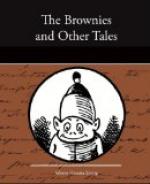Of all this Master Tom knew nothing. The report of the cracker seemed to him only an echo in his brain of a sound that had been in his ears for thirty-six weary hours. The noise of a heavy sea beating against the ship’s side in a gale. It was over now, and he was keeping the midnight watch on deck, gazing upon the liquid green of the waves, which, heaving and seething after storm, were lit with phosphoric light, and as the ship held steadily on her course, poured past at the rate of twelve knots an hour in a silvery stream. Faster than any ship can sail his thoughts travelled home; and as old times came back to him, he hardly knew whether what he looked at was the phosphor-lighted sea, or green gelatine paper barred with silver. And did the tutor speak? Or was it the voice of some sea-monster sounding in his ears?
“The spirits of the storm have gone below to make their report. The treasure gained from sunk vessels has been reckoned, and the sea is illuminated in honour of the spoil.”
* * * * *
The visitor now took a cracker and held it to the young lady. Her end was of white paper with a raised pattern; his of dark-blue gelatine with gold stars. It snapped, the bonbon dropped between them, and the young man got the motto. It was a very bald one—
“My heart is thine.
Wilt thou be mine?”
He was ashamed to show it to her. What could be more meagre? One could write a hundred better couplets “standing on one leg,” as the saying is. He was trying to improvise just one for the occasion, when he became aware that the blue sky over his head was dark with the shades of night, and lighted with stars. A brook rippled near with a soothing monotony. The evening wind sighed through the trees, and wafted the fragrance of the sweet bay-leaved willow towards him, and blew a stray lock of hair against his face. Yes! She also was there, walking beside him, under the scented willow-bushes. Where, why, and whither he did not ask to know. She was with him—with him; and he seemed to tread on the summer air. He had no doubt as to the nature of his own feelings for her, and here was such an opportunity for declaring them as might never occur again. Surely now, if ever, he would be eloquent! Thoughts of poetry clothed in words of fire must spring unbidden to his lips at such a moment. And yet somehow he could not find a single word to say. He beat his brains, but not an idea would come forth. Only that idiotic cracker motto, which haunted him with its meagre couplet:
“My heart is thine.
Wilt thou be mine?”
Meanwhile they wandered on. The precious time was passing. He must at least make a beginning.
“What a fine night it is!” he observed. But, oh dear! that was a thousand times balder and more meagre than the cracker motto; and not another word could he find to say. At this moment the awkward silence was broken by a voice from a neighbouring copse. It was a nightingale singing to his mate. There was no lack of eloquence, and of melodious eloquence, there. The song was as plaintive as old memories, and as full of tenderness as the eyes of the young girl were full of tears. They were standing still now, and with her graceful head bent she was listening to the bird. He stooped his head near hers, and spoke with a simple natural outburst almost involuntary.




